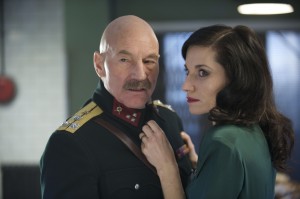When people think of “Macbeth,” they usually imagine the foggy moors of Scotland, not AK-47s and Stalinism. But last Wednesday’s PBS telecast of “Macbeth” boldly reimagined Shakespeare’s tragedy as a 20th century power struggle, with the charismatic Patrick Stewart portraying Macbeth as a bloodthirsty dictator.
The film recreates the 2008 Broadway production of “Macbeth.” Virtuosic director Rupert Goold and most of the original cast have returned and the Soviet-era costumes and sets have been retained. The stage version was incredible, so I approached the film with fairly high expectations. The movie doesn’t disappoint: It still entertains, and terrifies.
The movie opens with a striking montage depicting the Scottish civil war — a bloody hand, hospital gurneys, war footage and the three witches ripping out a soldier’s still-beating heart. After affable King Duncan (Paul Shelley) finds himself the victor, the witches appear to Macbeth, promising the lieutenant that he shall replace Duncan.
The skeptical Macbeth soon believes the witches’ prophecy, but becomes convinced that he must kill Duncan. Goaded into action by the seductive, power-hungry Lady Macbeth (Kate Fleetwood), Macbeth commits regicide. As the new monarch, Macbeth still does not feel secure, so he concludes that a reign of terror is necessary to kill all possible rivals. The ensuing chaos extends to men, women and children — no one is safe in this totalitarian world.
Despite the general savagery of “Macbeth,” some of the murders have been toned down from their onstage depiction. This is not a criticism, though. Goold clearly understands that, in cinema, less is more — what he doesn’t show outright, he shows indirectly, like a child’s doll lying next to a pool of blood. Such disturbing images, illuminated by high-contrast cinematography, linger in the viewers’ minds.
Still, some things are lost in the transition from stage to screen. Onstage, the ghost of the
murdered Banquo (a sly Martin Turner) appeared briefly to scare Macbeth. Then, after the
intermission, the actors reenacted the scene without Banquo, making Macbeth seem mad. In the movie, Banquo just reappears and the scene proceeds.
Granted, blatant theatrical tricks don’t work onscreen, but the daring Broadway staging was what made this “Macbeth” so innovative. Still, for people who didn’t see the play, the film is just fine as its own work of art.
“Macbeth” is a story of cosmic irony — the more people Macbeth kills, the more enemies he acquires. Stewart masterfully portrays Macbeth as an older man lunging at his last chance for power — he transitions from loyal retainer to clumsy assassin to psychotic tyrant. What makes him so chilling is that he’s not insane. He rationalizes his actions and eventually concludes that he is invincible, since he thinks fate is on his side.
Credit is also due to Fleetwood as Lady Macbeth, who finds that she has less taste for blood than she thought, while her husband has more. Fleetwood subtly indicates that Lady Macbeth is going crazy with guilt. Her character arc culminates with a sleepwalking monologue, which is delivered with remarkable realism. When she cries out in agony about the senseless violence around her, it seems genuine.
“Macbeth” deserves to sweep the television awards next year. Don’t miss it. The film can be streamed in its entirety, commercial-free, on www.pbs.org.
Gorman Jr. is a member of the class of 2014.




